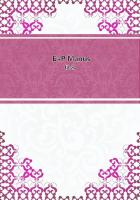When these impressions are made by alarming and formidable objects, it must needs be that they move the soul even of the wise man, so that for a little he trembles with fear, or is depressed by sadness, these impressions anticipating the work of reason and self-control; but this does not imply that the mind accepts these evil impressions, or approves or consents to them.For this consent is, they think, in a man's power; there being this difference between the mind of the wise man and that of the fool, that the fool's mind yields to these passions and consents to them, while that of the wise man, though it cannot help being invaded by them, yet retains with unshaken firmness a true and steady persuasion of those things which it ought rationally to desire or avoid.This account of what Aulus Gellius relates that he read in the book of Epictetus about the sentiments and doctrines of the Stoics I have given as well as I could, not, perhaps, with his choice language, but with greater brevity, and, I think, with greater clearness.And if this be true, then there is no difference, or next to none, between the opinion of the Stoics and that of the other philosophers regarding mental passions and perturbations, for both parties agree in maintaining that the mind and reason of the wise man are not subject to these.And perhaps what the Stoics mean by asserting this, is that the wisdom which characterizes the wise man is clouded by no error and sullied by no taint, but, with this reservation that his wisdom remains undisturbed, he is exposed to the impressions which the goods and ills of this life (or, as they prefer to call them, the advantages or disadvantages) make upon them.For we need not say that if that philosopher had thought nothing of those things which he thought he was forthwith to lose, life and bodily safety, he would not have been so terrified by his danger as to betray his fear by the pallor of his cheek.Nevertheless, he might suffer this mental disturbance, and yet maintain the fixed persuasion that life and bodily safety, which the violence of the tempest threatened to destroy, are not those good things which make their possessors good, as the possession of righteousness does.But in so far as they persist that we must call them not goods but advantages, they quarrel about words and neglect things.
For what difference does it make whether goods or advantages be the better name, while the Stoic no less than the Peripatetic is alarmed at the prospect of losing them, and while, though they name them differently, they hold them in like esteem? Both parties assure us that, if urged to the commission of some immorality or crime by the threatened loss of these goods or advantages, they would prefer to lose such things as preserve bodily comfort and security rather than commit such things as violate righteousness.And thus the mind in which this resolution is well grounded suffers no perturbations to prevail with it in opposition to reason, even though they assail the weaker parts of the soul; and not only so, but it rules over them, and, while it refuses its consent and resists them, administers a reign of virtue.Such a character is ascribed to AEneas by Virgil when he says, "He stands immovable by tears, Nor tenderest words with pity hears."(3 )CHAP.5.--THAT THE PASSIONS WHICH ASSAIL THE SOULS OF CHRISTIANS DONOT SEDUCE THEM
TO VICE, BUT EXERCISE THEIR VIRTUE.
We need not at present give a careful and copious exposition of the doctrine of Scripture, the sum of Christian knowledge, regarding these passions.It subjects the mind itself to God, that He may rule and aid it, and the passions, again, to the mind, to moderate and bridle them, and turn them to righteous uses.In our ethics, we do not so much inquire whether a pious soul is angry, as why he is angry; not whether he is sad, but what is the cause of his sadness; not whether he fears, but what he fears.
For I am not aware that any right thinking person would find fault with anger at a wrongdoer which seeks his amendment, or with sadness which intends relief to the suffering, or with fear lest one in danger be destroyed.The Stoics, indeed, are accustomed to condemn compassion.(1) But how much more honorable had it been in that Stoic we have been telling of, had he been disturbed by compassion prompting him to relieve a fellow-creature, than to be disturbed by the fear of shipwreck!
Far better and more humane, and more consonant with pious sentiments, are the words of Cicero in praise of Caesar, when he says, "Among your virtues none is more admirable and agreeable than your compassion."(2) And what is compassion but a fellow-feeling for another's misery, which prompts us to help him if we can? And this emotion is obedient to reason, when compassion is shown without violating right, as when the poor are relieved, or the penitent forgiven.Cicero, who knew how to use language, did not hesitate to call this a virtue, which the Stoics are not ashamed to reckon among the vices, although, as the book of the eminent Stoic, Epictetus, quoting the opinions of Zeno and Chrysippus, the founders of the school, has taught us, they admit that passions of this kind invade the soul of the wise man, whom they would have to be free from all vice.Whence it follows that these very passions are not judged by them to be vices, since they assail the wise man without forcing him to act against reason and virtue; and that, therefore, the opinion of the Peripatetics or Platonists and of the Stoics is one and the same.
But, as Cicero says,(3) mere logomachy is the bane of these pitiful Greeks, who thirst for contention rather than for truth.















